Vishing is a growing cybercrime terrorizing people from across the world.
Attackers target people through phone calls, leading them to reveal sensitive information and use it to cause harm.
According to Business Insider, 46% of American citizens receive spam calls every day. This is why authorities are warning people not to receive or respond to such phone calls.
Sometimes attackers can combine different types of attacks such as vishing, phishing, and smishing to attack the victims. Their main goal is to steal information in order to use a credit card, take money from the bank account, blackmail, and a lot more.
Hence, securing yourself from unsecured calls is crucial.
But how?
We will discuss just that in detail to help you avoid these attacks and save yourself.
What is Vishing?
Vishing, often called voice phishing, is a type of cyber attack where scammers use sweet social engineering techniques to convince the victims to act quickly and give up all the information they want.
It seems like it has some connection with phishing. Well, yes, it’s a type of phishing.
When you combine the word ‘voice’ with ‘phishing,’ it becomes vishing. This is no wordplay. This means that when attackers leverage their voice to make scams over a phone call, it is called fishing.
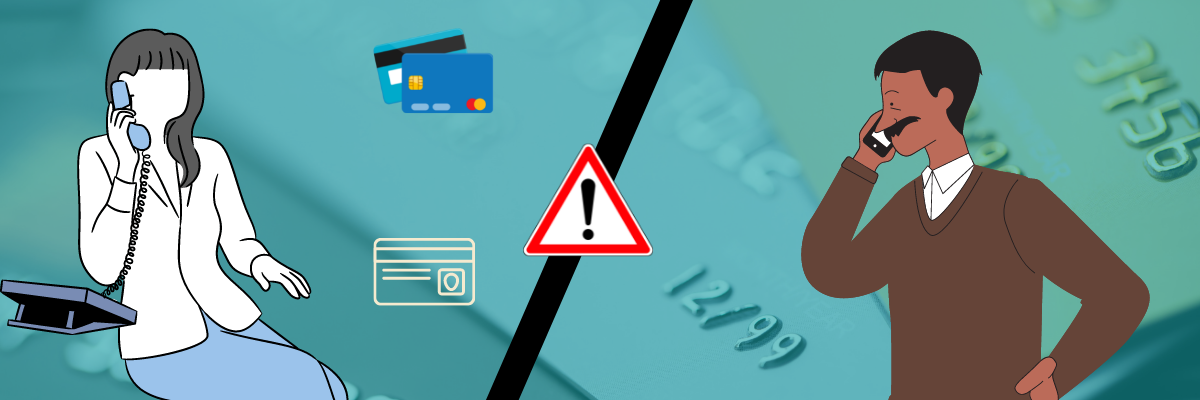
However, attackers use a stable VoIP service instead of emails and fake links. Their main target is to make you believe that you won something, your card is blocked, and many other techniques to trick you. Scammers use tricky, fancy words so that you believe in them and share your personal information and the next moment you see is nothing left in your bank account.
In other words, vishers use emotional, manipulative, and scare tactical terms so that you come under their influence and pressure and share your crucial information like card number, credit card details, passport number, pan card number, and so on. Their sole aim is to steal your identity, money, or both.
How does Vishing work?
Attackers follow a pattern to get in touch with the people:
- Vishers use auto-dialers to call many people until someone answers.
- Once a person gets in touch, they show to be a bill collector, IRS, social security, insurance agent, a technician, bank manager, holiday dealer, etc. They realistically describe the problem, try gaining your attention, end up taking your personal info.
- When they have your information, either they attempt to transfer funds from your bank account or make you pay some amount for certain services.
- If they have your credit card information, they purchase items as soon as possible before you block the card.
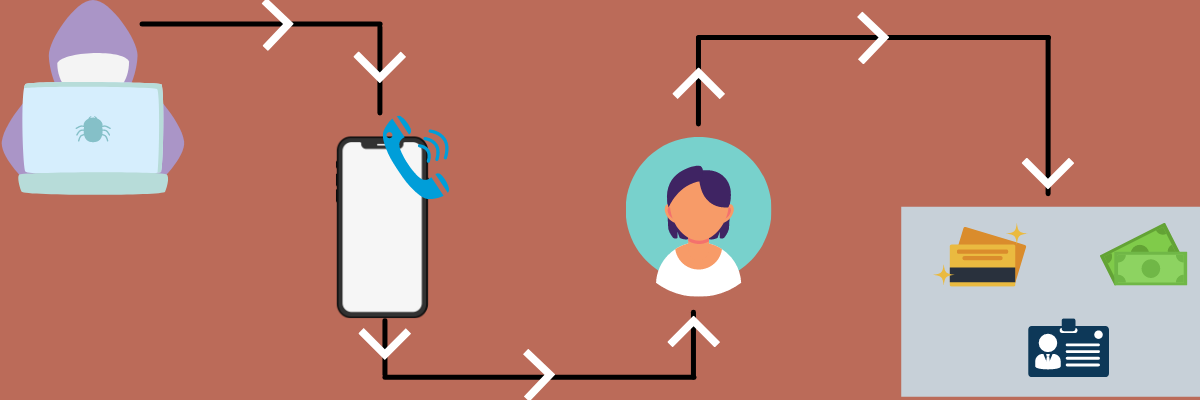
Upon completion of successful attacks, scammers disappear. These criminals know how to hide their identities in many instances. Tracking and catching them is way too difficult. Vishing started surfacing in the 2000s and has been increasing every year.
In 2020, these scams soared high when people began working from home due to the Covid-19 scenario. Scammers took advantage of the resources and used them against people to steal information, rob them of money, tarnish their reputation, and whatnot. The FBI and CISA released a joint report in the month of August 2020 about the increasing vishing attacks on organizations.
Many people confuse vishing and phishing as they seem similar, but there are some differences.
Let’s understand the difference.
Vishing vs Phishing
Vishing, phishing, and smishing are three different terms, but the motive is the same.
In a phishing attack, the victim receives emails, while in a vishing attack, the attacker calls the victim using VoIP service. A smishing attack is a way to steal information and bank account details through SMS.
As discussed above, vishing is a type of voice or VoIP phishing. The only difference between the two is the way of tracks they perform to scam people and organizations.
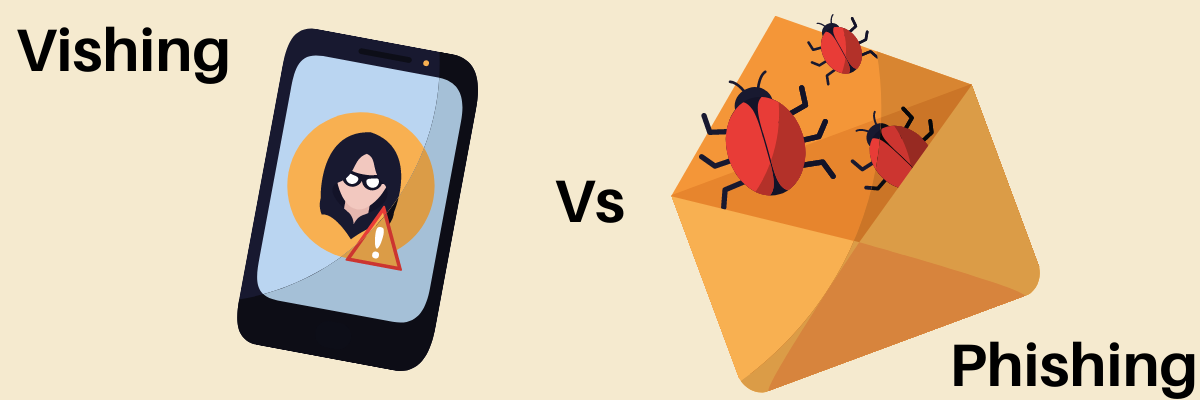
A scammer targets the phishing attack to a specific person’s email to send offers, achievements, rewards, and more along with a link. When you click over that link, you have already shared half of your information, i.e., location, etc.
In the link, you will find a form containing some blanks to fill up like name, address, mobile number, bank address, and more. The email is created in such a way that it would be difficult to interpret it as wrong.
On the other hand, vishing uses a phone call to do the same job. The criminals use the VoIP technology to build a spoofed number and a fake caller ID so that you never doubt the identity.
How to identify a Vishing Attack?
When you receive a call from an unauthorized number saying a lot of things as an authority, try to solve the puzzle in your mind. Think about what is correct and what is not. People generally make common mistakes.
Let’s discuss some ways to detect a vishing attack:
- When you receive an unknown call, sense the talking style of that person. Focusing on the voice and talking style will give you hints whether it looks suspicious or not.
- Remember that no banks call you regarding the debit or credit details over the phone. They always ask you to visit your nearest branch for the information. Any caller who asks this sort of details is a big sign that they want to steal your information. And if you cross question them, they will immediately hang up the call or you can do that directly.
- No companies provide unnecessary holiday packages to you without any reason. If you are getting any offer, don’t get excited rather act normally and deny the request.
- Facebook, Whatsapp, Instagram, or other platforms never send you any rewards. When you receive such scams, block that number.
- An organization never tells any IT team to call an employee regarding Covid-19 insurance and rules. When you receive such calls, ask them to call later and in between discuss with your mates and team lead.
- The most frequent scam that happens nowadays is delivery scams. Amazon or other shopping sites never call you to know your personal info instead they only confirm your order and ask you to call any representative for help. Stay alert from shopping-based vishing scams. If you are to receive an order, always make use of the given OTP on your registred phone number or email.
- Do not attend to any investment and loan scams. If you want to invest your money or take a loan for your personal use, directly visit the respective branches near you. No banks or mutual fund companies ask for your information over phone.
How to prevent vishing attacks?
Let’s figure out the different ways to prevent and secure yourself from vishing scams.
Sign up for “Do Not Call Registry”
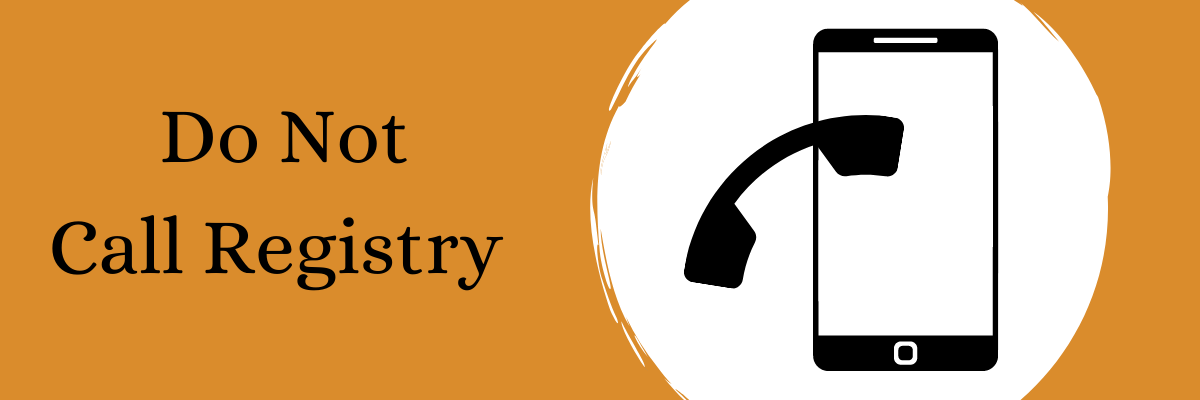
This is an easy way to avoid unwanted calls. The National Do Not Call Registry is made for you so that you do not have to block phone calls but rather tell telemarketers who they can’t call. Upon successful registration, expect up to 31 days to experience the action.
However, you receive calls from the organizations with whom you regularly deal, such as surveys, informational calls, political calls, debt collections, and more. There is no 100% result in this action, but you get assurance that no scam callers can call you.
Never share passport credentials
All the vishing scammers construct their hacking techniques to steal your money as well as identity. This is a serious issue all over the world. Those people who seek employment are generally targeted in this scam.
Scammers first look for those people in the social media platform like LinkedIn, Facebook, etc., if they are seeking a job and target them. Once they make a list, you will get a call with a fancy job offer with an unbelievable package. They ask you to give some information about you to proceed with the offer. They may ask your name, phone number, passport number, driver’s license, etc.
Remember that an organization doesn’t make direct contact over the phone with no formalities before, like sending emails, job descriptions, etc. When you receive such fancy offers, directly contact the company’s HR department to know if this is true.
Do not share your card details over a phone call
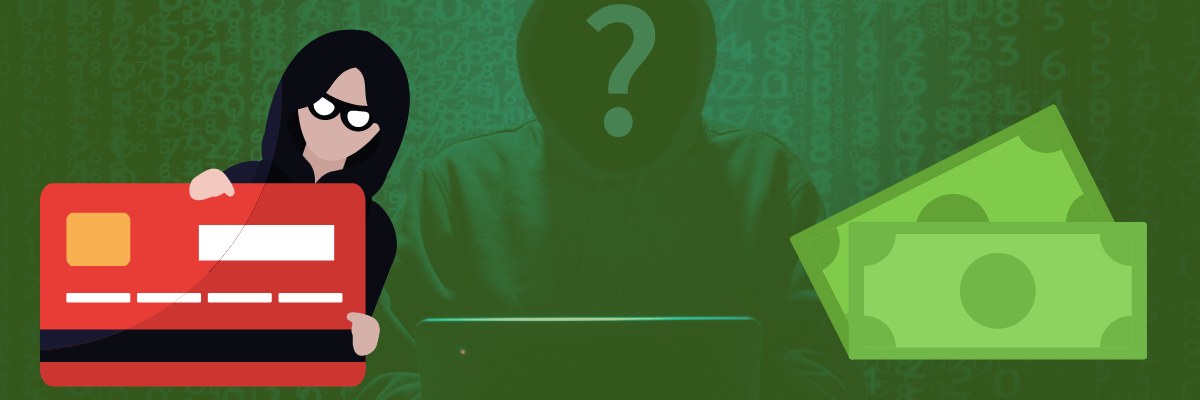
This is a common technique that every scammer uses to steal money. It is very simple for them to play with human emotions over the call and ask for their personal information like login credentials, card details, passwords, CVV, OTP, or more. You should know that no financial institutions or banks would ever ask you for such critical information.
Some may come through selling and buying platforms such as Craigslist or other second-hand item dealing apps or directly through VoIP calls. In both cases, their main intention is to steal your money, either an advance amount or the entire amount for the item you are selling or buying.
Remain vigilant when you receive such calls over the phone. You can also directly visit your nearest banks to know the offers and other things in a safer way. And when you are buying or selling an item, don’t agree to make transactions online with a person you don’t know anything about. Instead, tell them to visit you and see the item and make the purchase only after. Hearing this, they won’t call you back 🙂
Block Robocalls
Scammers also use technologies to do their job. They frequently use automated calls with an automatic delivery message for you. When you respond to that call, they come online and start talking with you, which looks very real.
In the past years, many people have received robocalls. They do not follow the National Do Not Call Registry. Thus, when you receive such calls and find them suspicious, immediately block that number manually with a few clicks.
Do not answer to unknown numbers
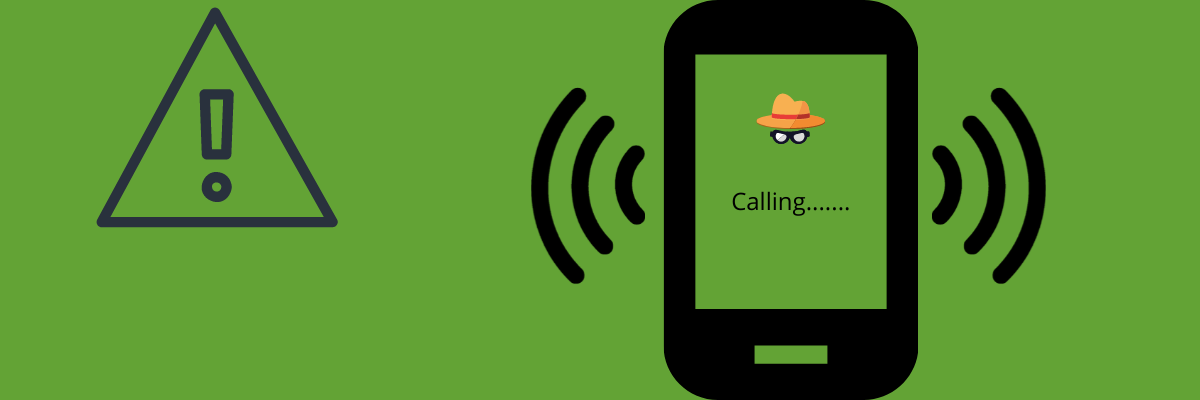
Blocking phone numbers will protect you from scammers but not always, as scammers don’t use a single source to call. Once they have your information, they call from different VoIP services and try to steal the information they want.
The best way to avoid such problems is never to answer such calls. When you see an unfamiliar number on your phone, try to avoid picking up the phone or disconnecting the call to secure yourself from the scam.
Train yourself with many scenarios
Search recent cases over the internet and gain proper knowledge from the other’s experience of how they suffer from the scammers or react to it. It will help you know how many people have been affected by such cases and how they are affected.
This way, you can become familiar with scammers’ methods to play with your mind. When a scammer calls you, they have your basic information. When you are aware of the cases, you act like an experience holder and never believe in them regarding any information they have and how they want to manipulate you.
Do not enter contests
People love to play games and win contests when they are asked to get paid for the same. This doesn’t seem right as you will not get any money if you win. When you start playing any contest, scammers leak your data from your phone and steal all your money from the bank.
In simple terms, if you get inside any contest, you will lose money rather than get any reward. So, avoid such calls by denying them.
Do not believe sweet words
A person forgets everything when they perceive any sweet words from the other end, such as:
- You are a lucky customer.
- You won a WhatsApp reward of $xxxxx.
- Facebook chose you as an active account holder for years.
And a lot more.
Do not trust these types of calls. No one is going to give you any reward for no reason. Avoid such calls instantly the moment you find it really sweet.
Alternatively, you can install an application, such as TrueCaller, YouMail, Hiya, etc., on your phone to know the caller’s location and identity. These will help you identify the caller’s identity and decide whether to receive the call or not. You can also block unnecessary scam calls to maintain peace in your life.
If you find any number that appeared to be spam in your caller, immediately hang up the call and block that number.
Use Blocking Apps
You can check out some below-mentioned applications to stay alert when you receive a junk call.
YouMail
Protect yourself from robocalls with YouMail that secures your phone. It stops spam and scam calls from coming into your phone, protects your phone number, and keeps your voicemail clean.
YouMail offers premium support and call blocking if you are a growing business and want protection from vishing. It will also add a virtual number with the area code so that you can route your customers with a virtual service provider. It can clear all the robocalls from a service provider’s network and offers easy integration into the current platform that complies with TRACED Act.

You will get premium blocking services for your customers. Large enterprises can also protect their brands from imposters. You will receive immediate alerts when scammers hijack your numbers. With the mobile application, you can manage the account easily, read every visual voicemail, and more.
Apart from call blocking, it provides various functions that help you as an individual and a business owner to make your daily activity normal. You will get a free phone number, free robocall blocker, free voicemail, free caller ID, call blocking, and more.
Download the free mobile version on your iOS and Android devices to block unwanted calls instantly.
Hiya
See who is calling and stop scams with the Hiya application. It identifies your incoming calls and blocks the numbers you want to ignore. It comes with options of reverse phone lookup and auto-blocking to offer a better phone experience.
Hiya provides real-time information so that you can decide whether to respond to the incoming call or block it. In addition, it protects your personal information, especially the information inside the phone.
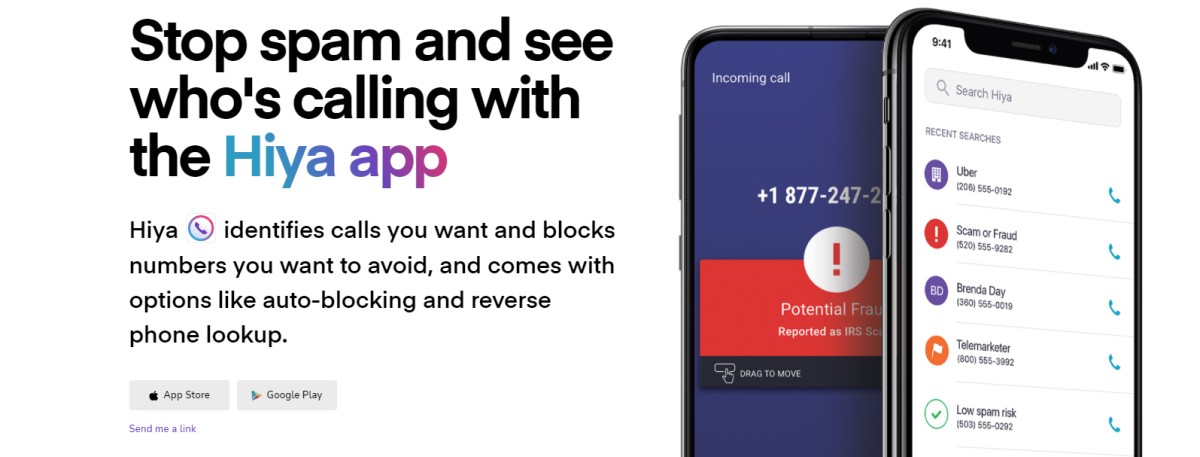
Moreover, your information is safe with Hiya as it does not sell your data to third parties. Thus, your data and calls are safe with the application, and you can take full of your calls. Hiya helps you to remove your number from spam if incorrectly labeled. Furthermore, you can remove all your data from its services forever. It delivers excellent performance to the organizations with the proper insights.
Hiya analyses call attempts, call durations, fraud calls, and more. It checks the answer rate, user reports, custom models, and data to block the phone numbers. You can also integrate Hiya with your business tools and protect your information from being stolen.
Truecaller
Truecaller is the world’s finest caller ID and spam blocking application. More than 300 million people use Truecaller to identify their incoming calls worldwide. It works based on community spam reporting that allows for quick and accurate protection from fraud, telemarketers, scams, and more.
Let Truecaller block unnecessary spam calls automatically before it rings, and never worry about the spammer with the trusted app. Choose an efficient way of communication by allowing Truecaller to make intelligent choices. It researches spam calls and harassment ways to put an end to every spam and also gives you the reason why the person is contacting you.
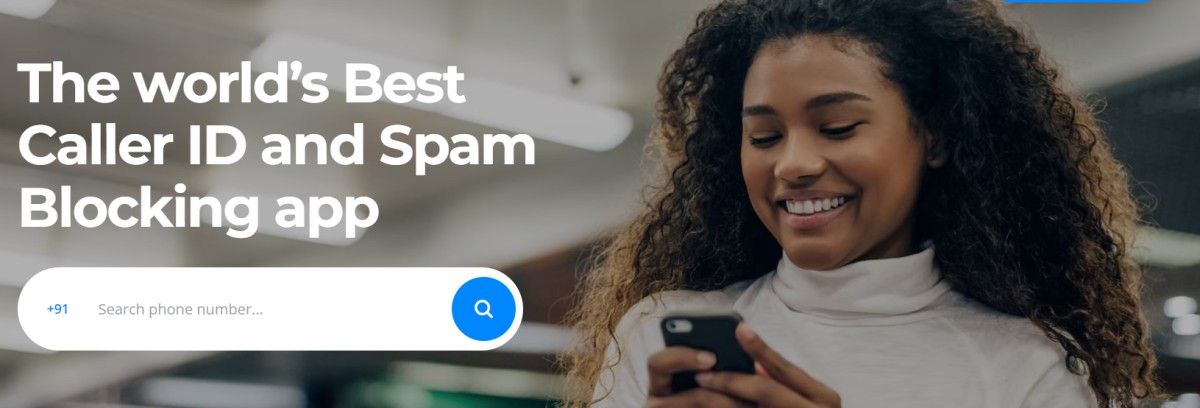
You will get previous records of the numbers along with the date and time to know how many calls you received on your phone. According to your conversation, it is designed to fight crimes by allowing you to label the callers as safe or spam. It also notifies you if it feels something unusual in the call.
Trust your communication with the true service and download the application on your Android or iOS devices. You can also download the Truecaller APK version. You will get features like caller ID, spam blocking, messaging, smart SMS, organized inbox, intelligent dialer, dark theme, call recording, and more.
Conclusion
Vishing attacks are increasing, and scammers are everywhere. You can not erase them as they use different techniques each time and frequently change their location and caller ID. But you can take some precautionary steps to ensure your safety. Ensure you never share any personal data with any unknown person and follow the steps mentioned above to stay one step ahead of the scammers.
You may also learn about some of the online scams on the internet.
Si quiere puede hacernos una donación por el trabajo que hacemos, lo apreciaremos mucho.
Direcciones de Billetera:
- BTC: 14xsuQRtT3Abek4zgDWZxJXs9VRdwxyPUS
- USDT: TQmV9FyrcpeaZMro3M1yeEHnNjv7xKZDNe
- BNB: 0x2fdb9034507b6d505d351a6f59d877040d0edb0f
- DOGE: D5SZesmFQGYVkE5trYYLF8hNPBgXgYcmrx
También puede seguirnos en nuestras Redes sociales para mantenerse al tanto de los últimos post de la web:
- Telegram
Disclaimer: En Cryptoshitcompra.com no nos hacemos responsables de ninguna inversión de ningún visitante, nosotros simplemente damos información sobre Tokens, juegos NFT y criptomonedas, no recomendamos inversiones

![9 Ways to Avoid Vishing Attacks [+3 Spam Blocking Apps]](https://cryptoshitcompra.com/wp-content/uploads/2022/03/1646791269_9-Ways-to-Avoid-Vishing-Attacks-3-Spam-Blocking-Apps-850x385.png)